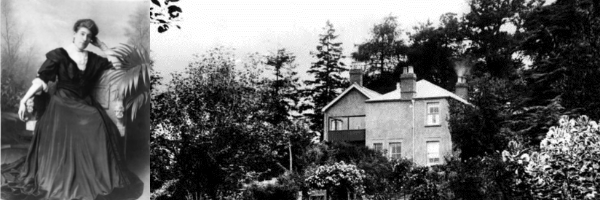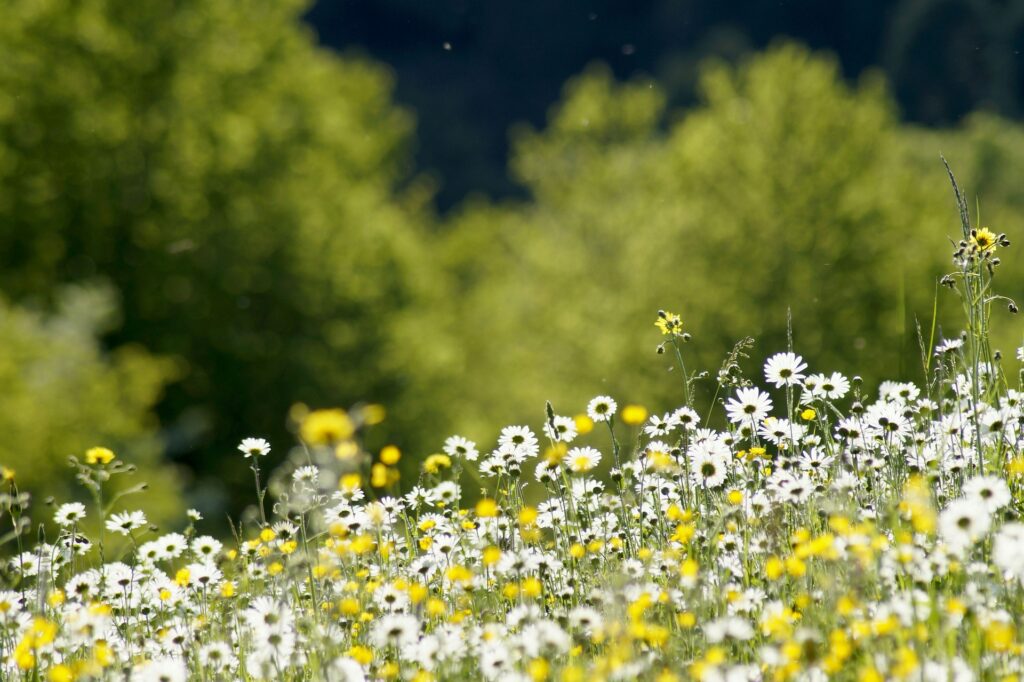Who?
I came across Flora Klickmann (1867 to 1958) when I was asked to contact a gentleman from the Forest named Charlie Miles who had researched this once internationally famous and now largely forgotten local author. Flora’s connection with the Forest and the Wye Valley began with visits to her aunts in Brockweir as a child. She spent much of her life living between London and the Valley, retired to Brockweir and is buried in the Moravian church there. Charlie and myself wrote an article about her for the local history society’s New Regard journal. You can find that here if you would like to know more.
My interview takes place in 1948, the occasion of the launch of Flora’s book, Weeding the Flower Patch, the last of the Flower Patch series.

1948 – the launch of Weeding the Flower Patch
Such a pleasure to be here! Do you know, the first book in this series was released in 1916, and here we are in 1948. That series has been a long time in the making. And – it’s not often one gets to launch a book at the age of 80, you know. Rather thrilling.
Congratulations, and a real achievement indeed! Why don’t we start our chat today with how you came to live in Brockweir – the setting for the books – as you originally hail from London.
I do. And in London I’d planned on a musical career, but, sadly, a dodgy heart forced me to abandon all that.
Give up music and go and rest, the doctor ordered. So, I gave up music and moved into journalism thinking it would be rather less stressful. But the need for rest also led me to the Valley and Brockweir. In any case, I never was very good at city life, too much newfangled nonsense, like electricity, and telephones to disrupt one day and night and typewriters clacking away. Always write with a quill pen, the proper way.
And you’ve lived here ever since, though you had to divide your time between London and Brockweir for the 22 years you were editor of The Girls Own Paper?
I did, and it is no secret how I always felt such blessed relief to return to my beloved cottage.
Let me go all the way back to those days and read to you from The Flower Patch to describe what it was like when we got to Tintern station. You’ll understand exactly what I mean. Here we are:

In the summer there is a good deal of bustle in this station, which is the haunt of many tourists. I am told that five out of every ten visitors are from the United States…. But we aren’t ‘foreigners’ (as the natives style everyone who doesn’t belong to their village). That is one of the many charms of arriving at this station. Here no one regards us merely as passengers who can’t find their luggage; or, passengers who expect the local porter to know by heart all the railway connections and times of return trains throughout the British Isles….
We “belong“.
So tell us how the first book came about.
Do you know, if I’d been toiling away in a London office rather than being here, those books would never have been written. You see, it happened this way… I thought the latest edition of the Girls had been put to bed, when a telegram arrived out of the blue telling me there were copyright issues with an article. So there we were, due to the printer, no time to waste, and we needed a new article. I happened to be in the garden, doing a spot of weeding with the poker when the telegram came. I cast around and saw Mother Nature’s glory in the profusion of flowers and I penned the article right off, just like that. I called it The Flower Patch.
And that was the beginning of the series!
It was. Readers wanted more such articles, and in early 1916, right in the middle of that first dreadful war, the book came out – and immediately went out of print! Five times!
I had no choice but to pen five more, with the last of those in ’33.
It all made my publisher a very happy, and doubtless wealthy, gentleman.
Tell us what the books are about and where you derive your inspiration for them.
They tell tales – all purely fictional of course – about the happenings in and around the village. But while I confess to making free with the characters of my good neighbours and dear friends and acquaintances, the real inspiration is from the Valley itself – its woods, the river, its views and its creatures.
The birds especially! How I adore them – such wonderful little beings, with all the vices and virtues of mankind between them. I loved them in London too, but there, as I have said, ‘our city pigeons, fascinating as they are, have a pushing pertinacity that is peculiarly their own.’
Indulge me for a time while I read to you about our country birds, from The Trail of the Ragged Robin:
The little wild things of our woods have not quite the hardihood of the Londoner. The jay certainly is bold and brazen; and the robin, of course, is convinced he is welcome, and samples … everything he can lay his beak on in the way of the food. But most of the others come inside with an apologetic air of “I hope I don’t intrude? but it is delightfully mild in here after the wind outside.
And the landscape too – you describe it many times in your work. Can you share with us what it means to you?
So many choices, but I think this is a rather good example as I was in a bit of a temper with an aggravating guest that day, and, frankly, needed to leave the house. Here is what I wrote:
I climbed up the hill, and up the hill; through a field bordered with crab-apple trees which was up for hay. At the edge of the path, creeping out from among the grass, were patches of the wild heartsease, making a brave stand with their tiny yellow-and-purple flowers. The rest of the field was a swaying sea of daisies and buttercups, clover and vetch, bugle and orchises, with that incredible misty sheen over all caused by the flowers of the finer grasses.

Sadly, what is happening in our countryside now, post war, is of real concern to you as your new book clearly shows.
It is. Our Valley is very precious, and fragile. I get so angry with the picnickers who come to enjoy the views and immediately despoil those very views by leaving their glass bottles behind them. As for these modern chemicals gardeners and farmers liberally splash around! Shocking, you will see, shocking. Never used anything not organic on any garden of mine.
But perhaps I am being overly pessimistic, being old and more prone to an irritable disposition. It would be sad to end our chat on a sour note, so let me take you to another passage. Here I’m talking about the miracles which occur in the woods after trees have been felled. Perhaps it will be like this for us – we can hope so.
You are not long wandering over the newly-cleared slopes before you see things that were not evident before. In winter you discover a red-gold carpet … where lie the leaves of the beeches that you never noticed when the trees were standing.
Then, as spring breathes life into the sleeping earth, the dead leaves stir, silently, mysteriously, no human ear can detect the rustle, no human eye can see the movement, yet the leaves lift and move apart, disclosing the yellow and green, and silvery-oink of the primrose buds.
Thank you, Flora. Let us indeed hope for such miracles as the years move forward, and all the very best for your latest book.
Thank you for having me. It has been a real pleasure.
To read more about Flora Klickmann‘s life and works, visit Reading the Forest which will also take you on a journey of discovery of other local authors over several hundred years.
I came across Flora as a recommendation, on an LM Montgomery (Anne of Green Gables) Facebook page! Similar time frame and love of nature evident in both authors’ writing.
Although I do have a question… On the first page of her last book is the line ‘such light domestic chores as disposing of the kittens …..’
eek!! I hope that was an interrupted sentence? And not disposing as in, getting rid of? What do you think…
It doesn’t make sense that Flora would write this (even if meant figuratively /or with irony) as she purports to be so smitten with all of nature …..?
Ha! Perhaps she meant giving them away? I cannot see her disposing of them any other way and certainly her readers would have been horrified! Although she did rather love birds. I can’t remember if she had a cat in Brockweir?
Learned only about Flora today 10th March 2024, fascinating. I live not many miles from Brockweir “Lydney” & have been to the Moravian Church where she is laid to rest on several occasions.
She was a very interesting woman, very independent and knew her mind! A former neighbour of mine grew up in Brockweir and Flora rented her first cottage there from my neighbour’s grandmother. That’s now how I found out about Flora, however – it was pure coincidence we happened to live across the road from each other when I did. Another friend’s wife also grew up there, knew my neighbour, and was married the first time round in the Moravian church. The Forest is a small place! Thanks for commenting!